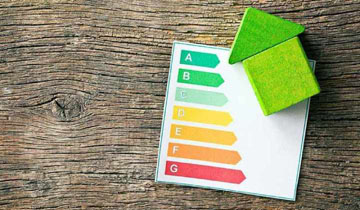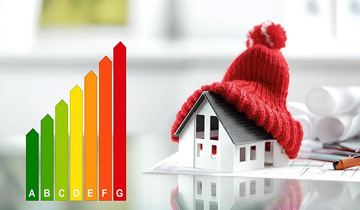5 min read
How SAP 10 will impact the heating industry
SAP 10 and its iterations has heavily featured in heating industry news since early 2018 and there is good reason for that. The latest iteration of...

There’s no denying it, prices for both gas and electricity have gone up significantly. Following an announcement by Ofgem in February 2022 about increasing the price cap which limits what energy suppliers can charge customers, prices have dramatically jumped up again.
The new prices came into effect on the 1st April 2022 and to illustrate what this means for homeowners, we’ll give you the following example.
Based on national average consumption of 2,900 kWh for unrestricted electricity and 12,000 kWh for gas and if you are paying by Direct Debit, the price cap change means that you will be paying £1,971 instead of £1,277. That’s an eye-watering annual increase of £694!
When it comes to the cost per kWh, the new price cap will increase electricity from £0.21 to £0.28 per kWh and for gas it has risen from £0.04 to £0.07 per kWh.
So, what can we do to help save electricity and reduce your energy bills? We’ve searched through the internet to find some of our top tips that could help you in the long-run.
Let’s begin!
This is probably one of the most important things to do before actioning any of the other tips in this blog. Traditionally energy bills can be confusing and difficult to identify what’s what. If you can decipher your energy bill, you are one step ahead on your journey towards reducing your energy bills. No matter your supplier, there is key information on your energy bill which will help you to see how you use your energy.
One of the best guides on energy bills has been created by Home Energy Scotland. It’s only four minutes long, but well worth watching. Watch – Understanding your energy bills here >
Many of you reading this blog could probably relate to this point. You’ve come back home, the family are relaxing in the living room, yet the upstairs is lit up like a Christmas tree. You head upstairs and room by room, you turn off light switch after light switch. This simple action can save you, on average, £20 on your energy bill.
It’s not just turning off the light switch in unoccupied rooms that will help. Investing in energy light bulbs such as LED lights. Not only will you reduce your energy bills but you’ll also reduce your carbon dioxide emissions by around 40kg every year.
Sometimes after a busy week of work, a long and relaxing soak in the bath is well-deserved. However, if you swapped having a bath for a shower just once a week then you’ll be saving £12 on your annual energy bill. On top of that, if your showers lasted no more than four minutes, you’ll be saving yourself an additional £70 each year on your energy bill. Plus, don’t forget that you will also be saving a lot more water!
Would you like to save £55 on your annual energy bill? Stop leaving electrical appliances on standby. TheGreenAge estimate that the UK waste £227m every year just from standby mode. The majority of electrical appliances can be switched off at the plug but it’s worth checking the instruction manuals before you do as some programming and recording functions can be disrupted if you do.
You can purchase standby savers but there are mixed views on how long it takes to pay back the investment. On average, a standby saver will cost £20 and if you use it with DVD players, games consoles and music systems which are associated with your TV, then you will reap the benefits.
If heat in your home is slowly being lost through small gaps in doors, floor boards and windows, it will be costing you money.
Why?
Let’s take a typical winters day. You have your heating on, it reaches temperature, turns off, some heat escapes, the temperature drops a little and then the heating kicks back in. Heat loss not only causes your heating to kick in more regularly, it also will take longer to heat the space to your set temperature all of which will increase your annual energy bill.
To help reduce heat loss there are a variety of draught-proofing measures you can do around the home. For example, for gaps between the skirting board and the floor you can use a silicon-based filler to plug them.
By undertaking some simple (and some not so simple) heat loss prevention measures, you’ll be on the road to saving around £40 annually on your energy bill.
One of the easiest ways to save money on your energy bills is to insulate pipes, the hot water cylinder and radiators (well, technically not insulate but we’ll come to that) in your home.
Here’s a couple of examples…
Fixing reflective panels behind each radiator, will allow the heat to be reflected back into the room rather than being lost to external walls. It’s particularly effective if you install them on uninsulated walls which are more commonly found in older buildings.
Using a British Standard jacket on your hot water cylinder to increase its insulation from 25mm to 80mm has the potential to save you around £35 each year. This is more than the jacket costs!
Finally, if you have any exposed hot water pipes which makes them easier to get to, why not add pipe insulation which can be bought for less than £2 per metre.
The kitchen is usually the room in the house with the most gadgets and gizmos but there are some simple things you can do in order to make a positive dent on your energy bills. These include:
Washing your clothes on a 30-degree cycle along with reducing use of your washing machine by once per week will add an additional £28 to your bank balance every year. Also, with the warmer months just around the corner, hanging the washing outside instead of tumble dryer will save you an additional £60 per year.
No. I don’t mean like the football club. You’d be relegated every other season and nobody enjoys that do they? (Sorry Norwich fans)
Be like the homeowners of Norwich who are most likely to continue to turn down their thermostats each winter as discovered by research conducted by Opinium in November 2021. This is good news for those Norwich homeowners as they’ll be saving around £120 each year just be turning down the thermostat by 1°C.
Another important point is that the Committee on Climate Change recommends thermostats are set no higher than 19°C to help combat global warming. So next time you are setting your heating schedule, stick to a maximum of 19°C if you can
The simple tips above will help you to keep your energy bills lower. Not only that, you’ll be doing something positive for the planet which is surely a good thing.
Thanks to the Energy Saving Trust for highlighting the monetary value that some of these tips can save on energy bills.
If you need further advice or some more top tips, our team are on stand-by to help. Simply, get in touch.

5 min read
SAP 10 and its iterations has heavily featured in heating industry news since early 2018 and there is good reason for that. The latest iteration of...

5 min read
Popularity in electric heating is rising and it won’t be slowing down any time soon. Let’s take the electric radiator market. By 2025 the European...

5 min read
If you are looking for energy saving tips on the internet, you’ll be presented a whole heap of different options. From not using a tumble dryer to...